After a devastating cyclone, Fiji’s women struggle to rebuild livelihoods
Date:
Author: Ellie van Baaren
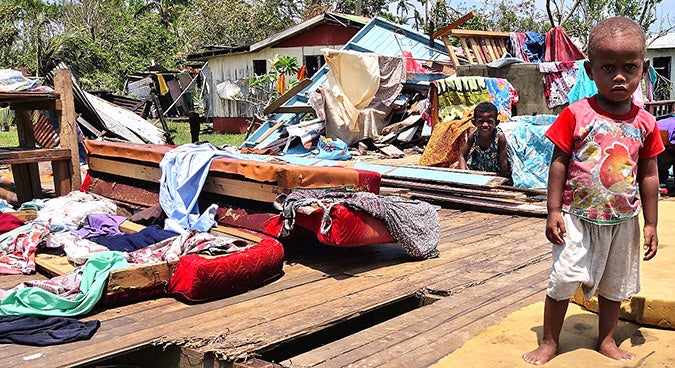
Suva, Fiji – Just six months ago, 29-year-old Sofia Talei was proudly showing visitors from UN Women her vegetable farm, sharing her plans for building her family’s future and her desire to play her part in keeping fresh food affordable for her fellow Fijians. Today those plans are in tatters.
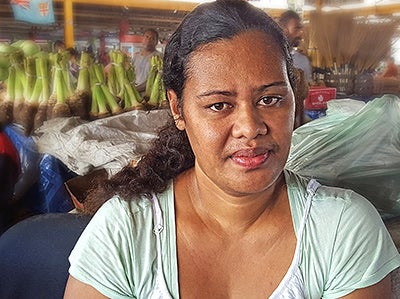
All of Ms. Talei’s crops were destroyed when Tropical Cyclone Winston, one of the biggest cyclones ever recorded in the Southern Hemisphere, ripped through Fiji on 20 February. Packing wind gusts of more than 300 kilometres per hour, it flattened villages, destroyed crops and damaged essential infrastructure. Among the casualties was Ms. Talei’s farm in Tailevu, an eastern coastal province near Suva.
"We placed so much expectation on our farm to help us pay for our expenses, including my children's education and medicine,” she said. “We need to salvage what we can to help us cover our expenses."
The woman was back at Suva Market just two days after the cyclone, but the root crops and other vegetables that usually fill up her stall were replaced with coconuts – all she has left to sell. What comes next is uncertain; it will take at least four months to get even the fastest-growing crops to the point where she can earn money from them.
Ms. Talei was at the market with her two young children; the schools were closed for a week because many of them were being used as evacuation centres.
Also hurt by the cyclone was Raj Wati, whose family income came from her pawpaw plantation in Sigatoka, a town on Viti Levu island at the mouth of the Sigatoka River. She had been investing most of her profits back into the plantation and using the rest to buy school supplies for her grandchildren and for the family’s living expenses.
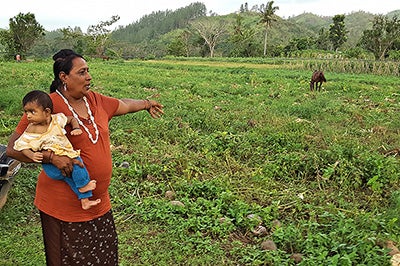
Ms. Wati had prepared the pawpaw for planting in April, when the rainy season ends. Now, the plants are all gone and anything growing near the river has been destroyed by flooding. Three days after the cyclone, she was at the local market selling leftover eggplant.
“We don’t know how long we will have any produce to sell,” Ms. Wati said. “Perhaps next week we won’t have anything to bring to the market.”
Ms. Talei and Ms. Wait are two of the thousands of women in Fiji who sell produce or handicrafts at local markets to pay for their children’s education and day-to-day living expenses. The destruction of crops and market buildings not only took away their source of income, but also threatens the food security of entire communities and their health, nutrition and education.
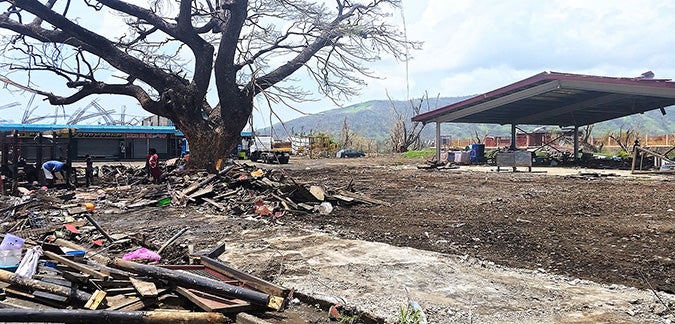
Through its Markets for Change project, UN Women will work with local partners to provide women market vendors with tools, supplies, seeds and training so they can replant their gardens and get back on their feet as quickly as possible. UN Women also will work with local governments to rebuild market buildings that were damaged or destroyed.
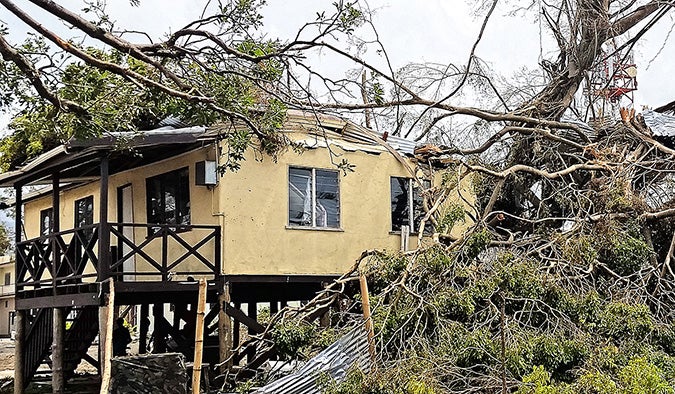
Government figures as of 27 February showed that the cyclone killed at least 42 people and affected almost 350,000 others. The UN Office for the Coordination of Humanitarian Affairs estimates that 51,000 people are still in evacuation centres more than a week after the cyclone hit.
Because of traditional gender roles, women and girls globally experience secondary impacts after any natural disaster, including increased burdens and increased risks of violence. They are expected to find food and look after the sick and elderly and do most of the unpaid care work, all of which increases their workload in times of hardship, injuries, and food shortages. Women are also overrepresented in vulnerable occupations, which are often not considered in recovery programmes – those programmes often focus on cash crop businesses usually run by men.
The women of Fiji already face rates of violence double the global average: 64 per cent of Fiji’s women experience physical and/or sexual violence from an intimate partner in their lifetime, according to a study done by the Fiji Women’s Crisis Centre. The risks increase after disasters, when women lose their shelters or find themselves exposed in evacuation centres, and when they must travel greater distances, or go out at night to find food and water or to use the bathroom. Anxiety and frustration also increases within the family. There were reports of increased rates of sexual and gender-based violence in Solomon Islands after the Gizo tsunami of 2007; marital rape in evacuation centres in Fiji in 2012; and a 300-per cent increase in new domestic violence cases at one women’s centre in Vanuatu after two cyclones hit the country in 2011.
In Rakiraki on Viti Levu Island, Cyclone Winston turned into rubble a market building where more than 200 people sold their goods. Falling trees left an accommodation centre for women rural vendors unusable; the centre had provided them with a safe place to sleep during the days they sold at the market.
In Fiji, UN Women is providing funds and technical support to organisations that work to end violence against women and girls. It is also working with local partners to create temporary market spaces that give women opportunities to sell their produce and access essential information about relief and protection services.
You can help us support the women and girls of Fiji and keep them safe by donating here: https://unwomen.org.au/take-action/donate/fiji-cyclone-appeal
For more information:
Please contact: Ellie van Baaren
Regional Media and Communications Specialist, UN Women
FB: www.facebook.com/unwomenpacific
Email: [ Click to reveal ]